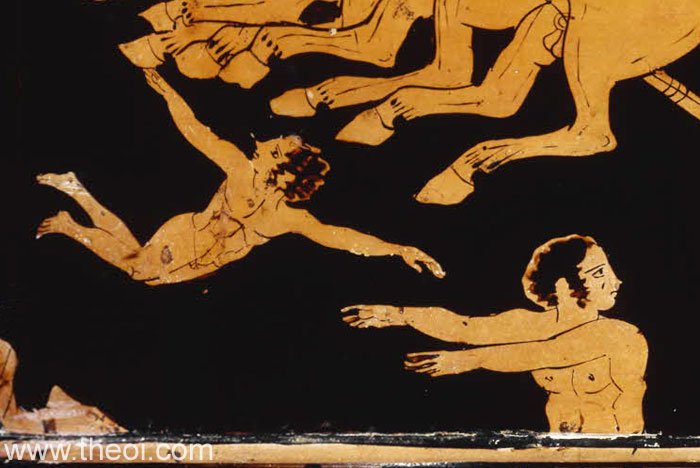Greek God of the Star Jupiter or Saturn (original) (raw)
Greek Mythology >> Greek Gods >> Sky Gods >> Star Gods >> Phaethon
PHAETHON
Translation
Blazing, Shining
Astra Planeta the star-gods, Athenian red-figure krater C5th B.C., British Museum
PHAETHON was the god of wandering star (aster planetos) Dios, the planet Jupiter. He was also identified him with planet Saturn (aster Kronion). According to some Phaethon was a star-born son of Eos (the Dawn) who was carried off by the goddess Aphrodite. Others say he was a son of Helios who was struck down by Zeus when he lost control of the chariot of the sun. His name was derived from the Greek verb phaethô meaning "to shine" or "blaze."
FAMILY OF PHAETHON
PARENTS
[1.1] ASTRAIOS & EOS (parents of the Astra, presumbly Phaethon) (Hesiod Theogony 378, Apollodorus 1.8)
[1.2] KEPHALOS & EOS (Hesiod Theogony 986, Apollodorus 3.181, Pausanias 1.3.1)
[1.3] TITHONOS & EOS (Apollodorus 3.181)
OFFSPRING
[1.1] ASTYNOOS (by Aphrodite) (Apollodorus 3.181)
ALTERNATE NAMES
Transliteration
Astêr Diôn
Latin Spelling
Aster Dion
Translation
Star of Zeus (Jupiter)
CLASSICAL LITERATURE QUOTES
Hesiod, Theogony 378 ff (trans. Evelyn-White) (Greek epic C8th or C7th B.C.) :
"And Eos (the Dawn) bare to Astraios (Astraeus, the Starry) the strong-hearted Anemoi (Winds) . . . a goddess mating in love with a god. And after these Erigenia [Eos] bare the star Eosphorus (Dawn-bringer), and the gleaming Astra (Stars) with which heaven is crowned."
Hesiod, Theogony 986 ff :
"Then [Eos the Dawn], embraced by [a mortal] Kephalos (Cephalus), she engendered a son, glorious Phaethon, the strong, a man in the likeness of the immortals; and, while he still had the soft flower of the splendour of youth upon him, still thought the light thoughs of a child, Aphrodite, the lover of laughter, swooped down and caught him away and set him in her holy temple to be her nocturnal temple-keeper, a divine spirit (Daimon Dios) [i.e. a star]."
Pseudo-Apollodorus, Bibliotheca 1. 8 - 9 (trans. Aldrich) (Greek mythographer C2nd A.D.) :
"The Titanes (Titans) had children . . . Eos and Astraios (Astraeus) were parents of Anemoi (Winds) and Astra (Stars)."
Pseudo-Apollodorus, Bibliotheca 3. 181 :
"Kephalos (Cephalus) [of Athens], whom Eos (the Dawn) developed a passion for and kidnapped. They had sex in Syria, and she bore him a son Phaethon, unless Tithonos [of Troy], was the father; Phaethon [was father] of Astynoos (Star-Wise), and Astynoos of Sandokos (Sandocus). Sandokos left Syria for Kilikia (Cilicia)."
Pausanias, Description of Greece 1. 3. 1 (trans. Jones) (Greek travelogue C2nd A.D.) :
"On the tiling of this portico [the Royal Portico at Athens] are images of . . . Hemera (Day) [i.e. Eos the dawn] carrying away Kephalos (Cephalus), who was in love with him. His son was Phaethon, afterwards ravished by Aphrodite . . . and made a guardian (daimon) of her temple. Such is the tale told by Hesiod, among others, in his poem on women."
Pseudo-Hyginus, Astronomica 2. 42 (trans. Grant) (Roman mythographer C2nd A.D.) :
"Planets. It remains for us to speak of the five stars which many have called wandering, and which the Greeks call Planeta . . . The second star [i.e. planet Saturn] is that of Sol [Helios]; others say of Saturnus [Kronos (Cronus)]. Eratosthenes [Greek writer C3rd B.C.] claim that it is called Phaethon, from the son of Sol [Helios]. Many have written about him--how he foolishly drove his father's chariot and set fire to the earth. Because of this he was struck with a thunderbolt by Jove [Zeus], and fell into the river Eridanus, and was conveyed by Sol [Helios] to the constellations."
Cicero, De Natura Deorum 2. 20 (trans. Rackham) (Roman rhetorician C1st B.C.) :
"Most marvellous [of all the stars of heaven] are the motions of the five Stars (Stellae), falsely called Planets or Wandering Stars (Stellae Errantes) . . . Below this [Phainon, the planet Saturn] and nearer to the earth moves the Star (Stella) of Jupiter, called Phaethon (the Blazing), which completes the same circuit of the twelve signs of the zodiac in twelve years, and makes the same variations during its course as the star of Saturnus [Kronos] . . . This regularity therefore in the Stars (Stellae), this exact punctuality throughout all eternity notwithstanding the great variety of their courses, is to me incomprehensible without rational intelligence and purpose. And if we observe these attributes in the Stars (Stellae), we cannot fail to enrol even them among the number of the gods."
Nonnus, Dionysiaca 5. 67 ff (trans. Rouse) (Greek epic C5th A.D.) :
"He [Kadmos (Cadmus) founder of Thebes] dedicated the seven gates [of the new-founded city] to the seven planets . . . The sixth he made an image of Zeus [i.e. the planet of Jupiter], shining high with more glorious craftsmanship."
SOURCES
GREEK
- Hesiod, Theogony - Greek Epic C8th - 7th B.C.
- Apollodorus, The Library - Greek Mythography C2nd A.D.
- Pausanias, Description of Greece - Greek Travelogue C2nd A.D.
- Nonnus, Dionysiaca - Greek Epic C5th A.D.
ROMAN
- Hyginus, Astronomica - Latin Mythography C2nd A.D.
- Cicero, De Natura Deorum - Latin Rhetoric C1st B.C.
BIBLIOGRAPHY
A complete bibliography of the translations quoted on this page.
